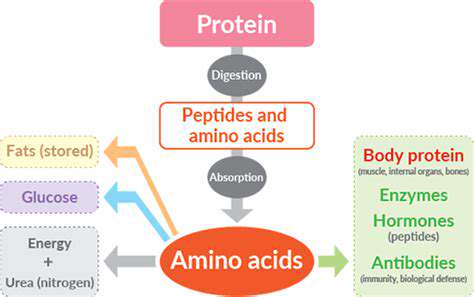Understanding Macronutrients: Fueling Your Body
Understanding Carbohydrates
Carbohydrates are one of the three primary macronutrients, alongside proteins and fats. They are crucial for providing energy to the body, particularly the brain and central nervous system. Our bodies break down carbohydrates into glucose, which serves as the primary fuel source for various bodily functions. Understanding how carbohydrates function is essential for anyone looking to optimize their health and well-being, whether through weight management, athletic performance, or simply maintaining a balanced diet.
Different types of carbohydrates exist, each with varying effects on the body. Simple carbohydrates, like sugars found in processed foods, are quickly digested and absorbed, leading to rapid spikes in blood sugar. Complex carbohydrates, on the other hand, are broken down more slowly, providing a more sustained release of energy. This difference is key to understanding how different carbohydrate sources affect our energy levels and overall health.
Classifying Carbohydrates: Simple vs. Complex
Simple carbohydrates, often referred to as sugars, are quickly digested and absorbed into the bloodstream. These include naturally occurring sugars like those found in fruits and milk, as well as added sugars frequently present in processed foods and sugary drinks. While these sugars provide a quick burst of energy, their rapid absorption can lead to blood sugar fluctuations and potential health concerns if consumed in excess.
Complex carbohydrates, conversely, are made up of long chains of sugar molecules. These molecules require more time to break down, leading to a gradual release of glucose into the bloodstream. This sustained energy release is more beneficial for maintaining stable blood sugar levels and providing long-lasting energy. Examples include whole grains, legumes, and starchy vegetables.
Carbohydrates and Energy Production
Carbohydrates are the body's preferred source of energy. When you consume carbohydrates, your body breaks them down into glucose. This glucose is then transported to your cells, where it's used to produce ATP, the primary energy currency of the body. Without adequate carbohydrate intake, your body may resort to breaking down protein for energy, potentially impacting muscle function and overall health.
Dietary Sources of Carbohydrates
A wide variety of foods contain carbohydrates. Fruits, vegetables, grains, legumes, and dairy products are all common sources. Choosing whole, unprocessed options over refined or processed foods is crucial for maximizing the nutritional benefits and minimizing potential health risks associated with excessive sugar intake. Understanding the carbohydrate content of different foods is key to creating a balanced and nutritious diet.
The Role of Carbohydrates in a Balanced Diet
Carbohydrates play a vital role in a balanced diet, providing the body with the energy it needs to function optimally. However, it's crucial to choose the right types of carbohydrates and consume them in moderation. A diet rich in whole, unprocessed carbohydrates, like fruits, vegetables, and whole grains, is generally more beneficial than one heavily reliant on processed foods and added sugars. This balance is essential for overall health and well-being.
Carbohydrates and Blood Sugar Management
The impact of carbohydrates on blood sugar levels is a significant concern for many people. Understanding how different types of carbohydrates affect blood sugar is crucial for managing diabetes or preventing blood sugar imbalances. By making informed choices about carbohydrate intake, individuals can better control their blood sugar levels and potentially improve their overall health outcomes.
Carbohydrates and Athletic Performance
Athletes often need to optimize their carbohydrate intake to support intense training and competition. Carbo-loading strategies, for example, involve increasing carbohydrate intake before an event to maximize glycogen stores in the muscles. This stored glycogen provides a readily available energy source during physical activity. Understanding the role of carbohydrates in athletic performance is critical for achieving peak physical condition and optimal results.

- Oven Baked Dinners: Less Mess, More Flavor
- Baking Tips and Tricks: Achieve Perfection
- Vegetarian Dinner Party Ideas: Impress Your Guests
- Low Sugar Meals: Balanced and Delicious
- How to Store Apples: Keep Them Crisp
- Baking Cookies for Holiday Gifting: Festive and Delicious
- Healthy Holiday Recipes: Guilt Free Feasting
- Homemade Tomato Sauce: Fresh and Flavorful
- Vegan Breakfast Smoothie Bowls: Nutritious and Delicious
- Exploring Scandinavian Christmas Cookies: Festive Treats
- Cooking with Air Fryer Oven: Versatile Appliance
- How to Store Green Beans: Keep Them Fresh